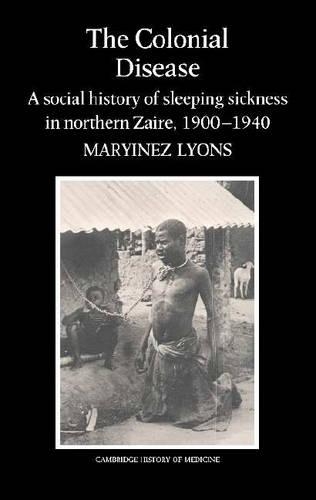
Colonial Disease
Series: Cambridge Studies in the History of Medicine
The Belgians commonly referred to their colonisation of the Congo as a 'civilising mission', and many regarded the introduction of Western biomedicine as a central feature of their 'gift' to Africans. By 1930, however, it was clear that some features of their 'civilising mission' were in fact closely connected to the poor health of many of the Congolese. The Europeans had indeed brought scientific
NaN
VOLUME
English
Hardback

The Belgians commonly referred to their colonisation of the Congo as a 'civilising mission', and many regarded the introduction of Western biomedicine as a central feature of their 'gift' to Africans. By 1930, however, it was clear that some features of their 'civilising mission' were in fact closely connected to the poor health of many of the Congolese. The Europeans had indeed brought scientific enquiry and Western biomedicine; but they had also introduced a harsh, repressive political system which, coupled with a ruthlessly exploitative economic system, led to the introduction of new diseases while already-existing diseases were exacerbated and spread. Tropical, or 'colonial', medicine was a new field at the turn of the century, linked closely both to European expansionism and human trypanosomiasis, or sleeping sickness. In 1901 a devastating epidemic had erupted in Uganda, killing well over 250,000 people. Over the next decades other African colonies, including the Belgian Congo, experienced epidemic sleeping sickness. By the 1960s and independence, many Africans had come to regard sleeping sickness as the 'colonial disease' because of the truly draconian measures taken by some colonial administrations in their attempts to check the spread of the disease. Sleeping sickness captured the colonial imagination to such an extent that it continued to dominate medical attention for many years. As a consequence, other glaring public health needs of the Congolese were ignored over decades.This is a study of the early colonial history of Zaire (formerly the Belgian Congo), with special emphasis on disease and medicine. Using the example of sleeping sickness epidemics, Dr. Lyons discusses the ways that Western medicine and its practitioners came in conflict with African ideas and health practices. It is the author's contention that while the Europeans had brought scientific inquiry and Western bio-medicine to Africa, they had also introduced a harsh, repressive political system coupled with a ruthlessly exploitative economic system that led to the introduction of new diseases and the exacerbation of those already present. Sleeping sickness captured the colonial imagination to such an extent that it continued to dominate medical attention for decades, to independence and beyond. This case study in the social history of the disease and its treatment in early colonial Africa suggests that the "colonial disease" and its impact was a consequence of the Western civilizing mission.
Price Comparison [India]
In This Series
Bestseller Manga
Trending NEWS




















